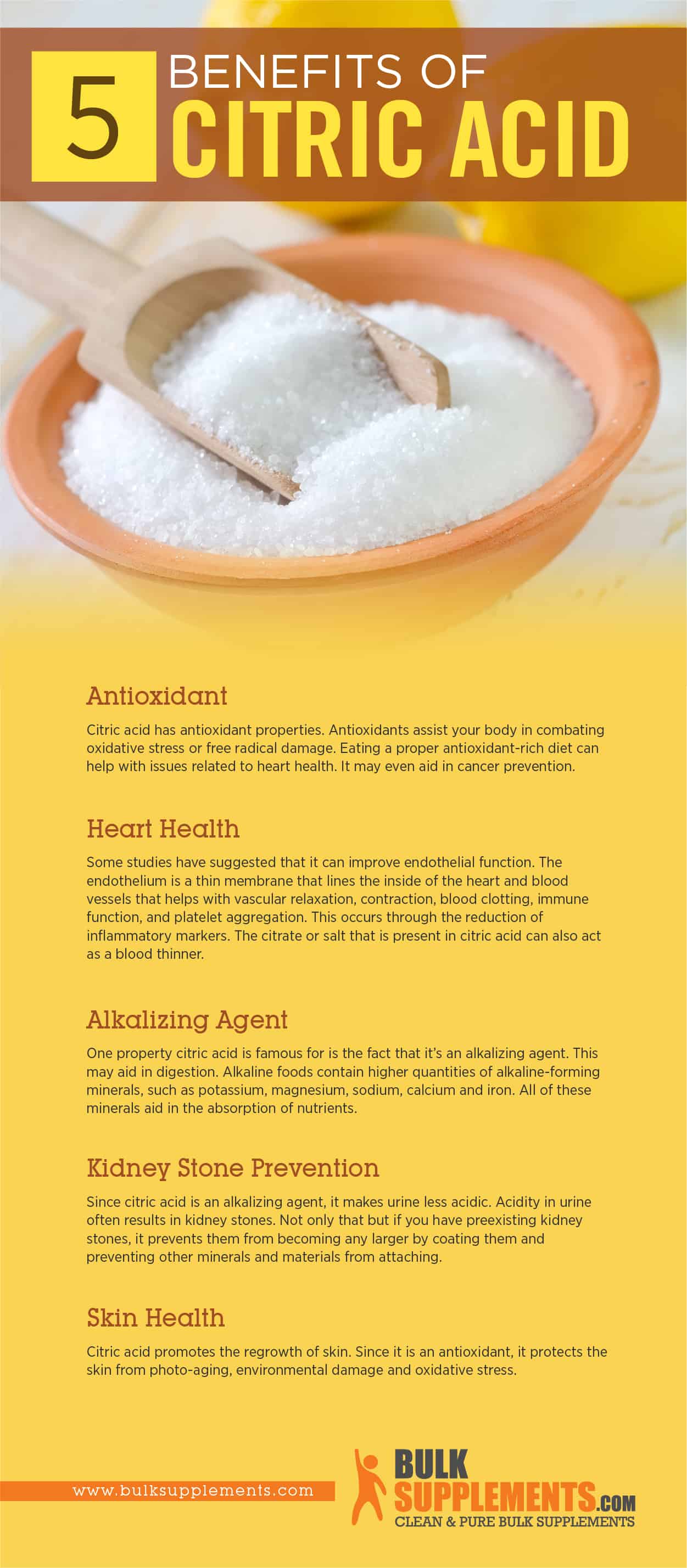What is Citric Acid?
You have likely heard of ascorbic acid, which is just another name for vitamin C. As for citric acid, however, you may only recognize it if you frequently read the ingredient list on packaged food items. Citric acid is a naturally occurring organic acid found in citrus fruits. Over a number of years, it has become a very common food additive, mostly for preservation or flavoring purposes. In fact, over a million tons of it are manufactured each year to be used as an acidifier, as well as for flavoring and chelating (x).
History
Citric acid has been used for medicinal purposes for centuries. Many cultures strictly used the natural form of citric acid found primarily in fruits, vegetables and herbs. It was believed that it could cause upset stomach if taken in too high of a dose. But in the proper dosage, it would aid in digestion, positively influence the liver and gall bladder, support lung health and promote the healthy flow to bile (x, x).
It wasn’t until 1890 that industrial production of citric acid began. The production was based around Italian citrus fruits, but it was discovered that it could also be derived from Penicillin mold just three years later. However, when World War I disrupted Italian citrus exports, a microbial-based production of citric acid became more necessary. This is around the time that an American food chemist discovered that strains of the mold Aspergillus niger (black mold) were more effective producers of citric acid (x, x, x).
The method of producing it via the mold Aspergillus niger is still in use today. It is popular to use a relatively inexpensive form of sugar, such as molasses or corn steep liquor to feed the mold in order to produce citric acid. Once the mold is filtered out of the solution, the acid can be isolated using the same processes that were once used to extract it from citrus fruit juice. The solution is precipitated with calcium hydroxide to then make calcium citrate salt. Finally, it is treated with sulfuric acid in order to regenerate citric acid (x).
Citric Acid Benefits
When consumed in the proper doses, and when derived from a natural source, citric acid can have amazing health benefits. It has become increasingly popular as a supplement in powder form. When it is produced in this manner, it tends to be synthetic and is often strictly used for canning, drying, or freezing food for preservation purposes. There is scientific evidence to support certain medical claims surrounding the consumption of citric acid. For example, it is a powerful antioxidant and anti-inflammatory agent. It improves endothelial functioning, has alkalizing effects, promotes skin health and may even prevent kidney stones (x).
Antioxidant
Citric acid has antioxidant properties. Antioxidants assist your body in combating oxidative stress or free radical damage. Eating a proper antioxidant-rich diet can help with issues related to heart health. It may even aid in cancer prevention (x).
Heart Health
Some studies have suggested that it can improve endothelial function. The endothelium is a thin membrane that lines the inside of the heart and blood vessels that helps with vascular relaxation, contraction, blood clotting, immune function, and platelet aggregation. This occurs through the reduction of inflammatory markers. The citrate or salt that is present in citric acid can also act as a blood thinner (x).
Alkalizing Agent
One property citric acid is famous for is the fact that it’s an alkalizing agent. This may aid in digestion. Alkaline foods contain higher quantities of alkaline-forming minerals, such as potassium, magnesium, sodium, calcium and iron. All of these minerals aid in the absorption of nutrients (x).
Kidney Stone Prevention
Since citric acid is an alkalizing agent, it makes urine less acidic. Acidity in urine often results in kidney stones. Not only that but if you have preexisting kidney stones, it prevents them from becoming any larger by coating them and preventing other minerals and materials from attaching to them(x).
Skin Health
Citric acid promotes the regrowth of skin. Since it is an antioxidant, it protects the skin from environmental damage and oxidative stress (x).

Citric Acid in Food
Since citric acid is an organic substance, it can be found naturally in many foods. If you choose to consume it naturally, it allows you to avoid any synthetic product. The fruits that have the highest concentration are limes and lemons, as well as their juices. Other citrus fruits, such as oranges, grapefruits and tangerines also contain it. However, there are other less acidic fruits like pineapple, strawberries, raspberries, gooseberries and cranberries that contain citric acid. If you are looking to boost your intake, natural foods are a great way to do so. Even consider juicing the fruits for a more potent dose if needed. However, it is important to be aware of potential side effects (x).
Citric Acid Side Effects
When changing your diet, it is crucial to understand possible side effects. It is best that you consult a physician before taking any supplements to ensure that no extremely hazardous side effects could occur. This is especially important if you have any preexisting medical conditions or if you take prescription medication.
The most common side effects occur after you’ve consumed more than the recommended dosage. This can result in gastrointestinal discomfort, dizziness, muscle cramps, or even tingling or numbness of certain parts of your body. There is also a risk of skin irritation if using it topically, such as with cosmetics or ointments. When used in cleaning products it can also trigger some asthma-related symptoms (x).
Is Citric Acid Bad for You?
Despite the fact that it is natural, many believe that citric acid can be harmful. This belief generally stems from the synthetic form, especially due to the fact that it is made by manipulating black mold. Since synthetic citric acid comes from black mold, there is the fear that it could trigger mold reactions that can cause impaired immune function, chronic disease or allergic reactions (x). However, the strain of Aspergillus niger that is used in its production appears to be harmless to humans (x).
The other documented fear surrounding the consumption and use of citric acid in household items is the fact that they will always use the cheapest source of sugar to feed the mold when it is being produced. This results in the use of GMO corn and beet sugars to make a synthetic form.
Citric Acid Dosage
Although citric acid is sold in the supplemental form (x), it isn’t used in the same way or in the same concentration as other supplements are, and it generally is found in the form of a powder. The dosage recommended by Bulk Supplements is one teaspoon per quart of juice or water for most fruits and vegetables when used for canning, drying, or freezing. This form of citric acid makes at home food preservation easy and affordable.
The FDA has given synthetic citric acid the green light for safety when it comes to food additives, but only when used in specific or limited amounts (x).
The Bottom Line
Citric acid can have some amazing health benefits and even help preserve food at home. It is important to keep in mind food safety guidelines and proper dosage when it comes to supplementation. Always consult your doctor before making major changes to your diet and especially when implementing any supplements to your regimen.


